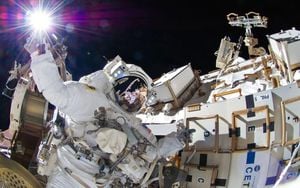Pope Francis has made headlines by calling for an investigation to evaluate whether Israel's actions against Gaza amount to genocide. This unprecedented statement follows more than six weeks of intense conflict, which has resulted in staggering casualties. The Pope’s comments, made during an interview for a new book by Hernán Reyes Alcaide, suggest he is particularly concerned about the humanitarian situation facing Palestinians.
"According to some experts, what is happening in Gaza has the characteristics of a genocide," Pope Francis stated, underscoring the urgency of determining whether Israel's conduct meets the legal definitions set forth by international law. This call for inquiry marks the Pope's most significant commentary on the Israeli-Palestinian conflict during this period. He expressed the need for careful investigation “to determine whether it fits the technical definition formulated by jurists and international bodies.”
The Pope's remarks arrived just days after Saudi Arabia’s Crown Prince Mohammed bin Salman characterized Israel's actions as genocidal at the Arab-Islamic Summit 2024. He openly condemned the military operations as aggressive and disproportionate, echoing the sentiments expressed by the Catholic leader.
According to the latest figures, nearly 44,000 Palestinians have lost their lives since the outbreak of hostilities on October 7, 2023, when Hamas militants launched surprise attacks killing approximately 1,200 Israelis. The Gaza Health Ministry, which reports on casualties from the region, cites these figures, albeit amid allegations of inflated numbers, especially since they do not separate combatant deaths from civilian casualties. Nevertheless, organizations such as the United Nations High Commissioner for Human Rights regard these reports as reliable.
Recently published data from the UN indicates over 70% of those killed are women and children, raising alarms about the humanitarian crisis. The UN has accused Israel of targeting civilians deliberately—a claim supported by various humanitarian groups and independent investigations. The dire conditions faced by displaced people and the destruction of infrastructure have drawn widespread international criticism.
Joining the Pope’s calls for clarity, the International Criminal Court (ICC) has also sought arrest warrants against Israeli leaders, including Prime Minister Benjamin Netanyahu and his former defense minister for their roles during this conflict. These actions are perceived as part of broader legal efforts to hold various parties accountable for their alleged war crimes.
The discussion surrounding these events has not only surfaced legal discussions but also sparked significant public debate about the definition of genocide itself, especially within the academic community, which is now more engaged than ever due to the urgency of the situation.
Wikipedia has now included the term “Gaza Genocide” on its list of genocides, following intense dialogue among editors and academics about the need for heightened awareness of the consequences of the conflict. This addition signifies the increasing recognition of the situation's severity at both grassroots and academic levels.
Beyond academic circles, global political leaders—including those from nations like China, Russia, Brazil, and South Africa—have joined the call for accountability, with many asserting their concern over the humanitarian violations occurring within Gaza.
The Pope has historically vocalized his worries about the humanitarian crisis, repeatedly calling for immediate ceasefires and interventions to pave the way for peace. His recent remarks seem to embody the broader international outcry for accountability and highlight the urgent need for investigations by independent international bodies.
With growing calls for action against alleged war crimes, and platforms from where global public opinion can be shaped, the Pope's words aim to catalyze discussions at the highest levels of sovereignty and governance.
Critics of the Israeli administration argue the focus should shift from geopolitical maneuverings to the immediate humanitarian needs of civilians. They argue the horrendous conditions faced daily by those residing within Gaza deserve immediate attention from international communities, advocating for pressure on world leaders to act decisively.
Pope Francis’s call for reconciliation and investigative truth-telling about the catastrophic situation resonates powerfully both within and outside of religious contexts, emphasizing humanity’s collective moral responsibility to prevent such tragedies. Embedded within his appeal is the hope for healing, not only for the beleaguered citizens of Gaza but for sustained peace across the wider region.
At this juncture, as discussions about the conflict's ramifications continue to evolve, one truth remains evident: the toll of war extends far beyond the battlefield, impacting countless civilians, humanitarian infrastructures, and future generations.
While the investigation is yet to be established, the urgent conversations prompted by the Pope and other international leaders indicate the global community is increasingly unwilling to overlook actions deemed as potential violations of human rights and protections.
Pope Francis’s recent statements symbolize more than just rhetoric; they represent an elevatory call for reflection on the part of citizens and policymakers alike—a reminder of the shared humanity binding individuals across continents.
The narrative about Gaza demands visibility, urgency, and moral clarity. How these developments will reshape public policy and humanitarian interventions remains to be seen as the international community grapples with how best to respond to allegations of severe human rights violations.



